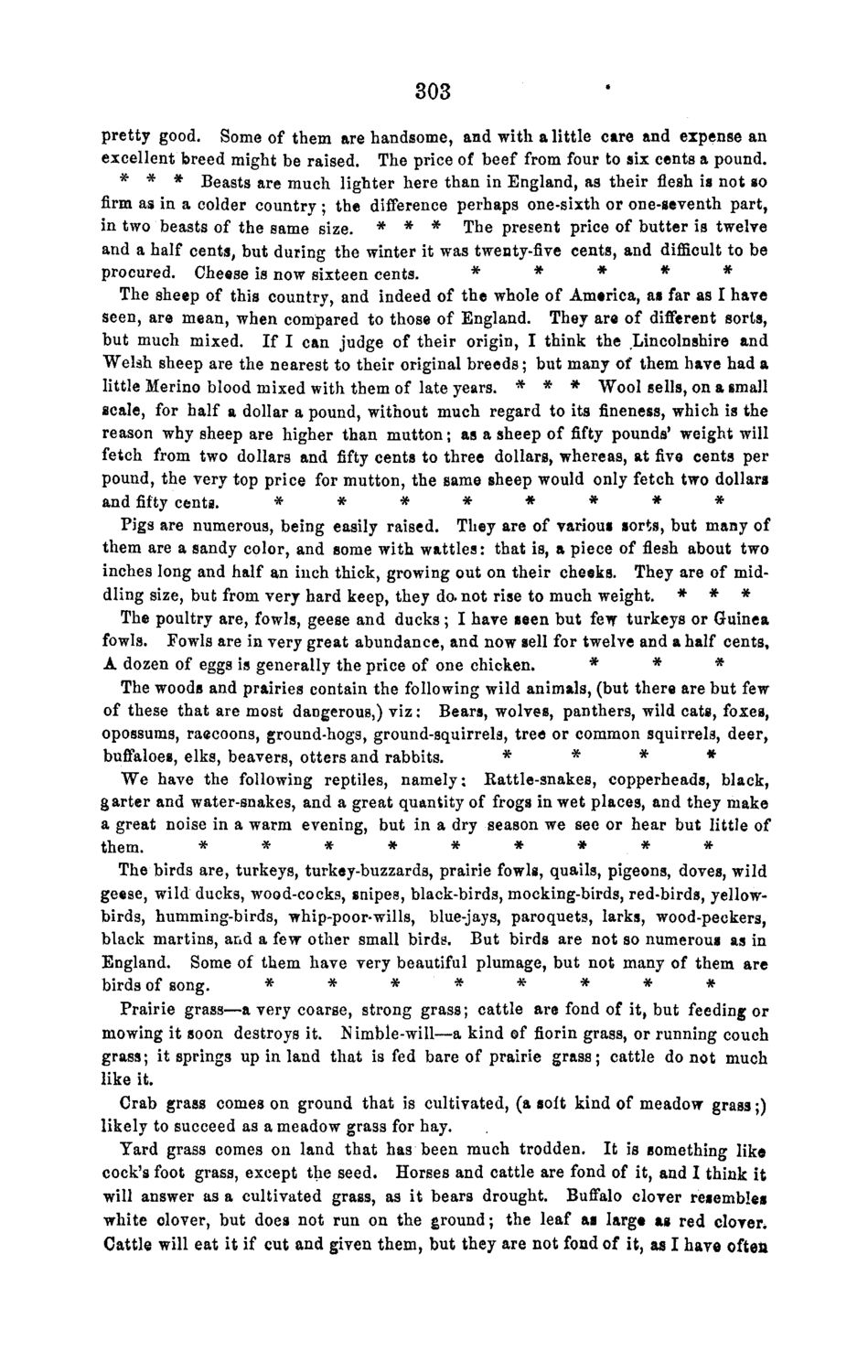| |
| |
Caption: Board of Trustees Minutes - 1868
This is a reduced-resolution page image for fast online browsing.

EXTRACTED TEXT FROM PAGE:
303 pretty good. Some of them are handsome, and with a little care and expense an excellent breed might be raised. The price of beef from four to six cents a pound. * # * Beasts are much lighter here than in England, as their flesh is not so firm as in a colder country ; the difference perhaps one-sixth or one-seventh part, in two beasts of the same size. * * * The present price of butter is twelve and a half cents, but during the winter it was twenty-five cents, and difficult to be procured. Cheese is now sixteen cents. * * * * * The sheep of this country, and indeed of the whole of America, as far as I have seen, are mean, when compared to those of England. They are of different sorts, but much mixed. If I can judge of their origin, I think the Lincolnshire and "Welsh sheep are the nearest to their original breeds; but many of them have had a little Merino blood mixed with them of late years. * * * Wool sells, on a small scale, for half a dollar a pound, without much regard to its fineness, which is the reason why sheep are higher than mutton; as a sheep of fifty pounds* weight will fetch from two dollars and fifty cents to three dollars, whereas, at five cents per pound, the very top price for mutton, the same sheep would only fetch two dollars and fifty cents. * * * * * * * * Pigs are numerous, being easily raised. They are of various sorts, but many of them are a sandy color, and some with wattles: that is, a piece of flesh about two inches long and half an inch thick, growing out on their cheeks. They are of middling size, but from very hard keep, they do. not rise to much weight. * * * The poultry are, fowls, geese and ducks; I have seen but few turkeys or Guinea fowls. Fowls are in very great abundance, and now sell for twelve and a half cents* A dozen of eggs is generally the price of one chicken. * * * The woods and prairies contain the following wild animals, (but there are but few of these that are most dangerous,) viz: Bears, wolves, panthers, wild cats, foxes, opossums, raccoons, ground-hogs, ground-squirrels, tree or common squirrels, deer, buffaloes, elks, beavers, otters and rabbits. * * * * We have the following reptiles, namely; Kattle-snakes, copperheads, black, garter and water-snakes, and a great quantity of frogs in wet places, and they make a great noise in a warm evening, but in a dry season we see or hear but little of them. * * * * * * * * * The birds are, turkeys, turkey-buzzards, prairie fowls, quails, pigeons, doves, wild geese, wild ducks, wood-cocks, snipes, black-birds, mocking-birds, red-birds, yellowbirds, humming-birds, whip-poor-wills, blue-jays, paroquets, larks, wood-peckers, black martins, and a few other small birds. But birds are not so numerous as in England. Some of them have very beautiful plumage, but not many of them are birds of song. * * * * * * * * Prairie grass—a very coarse, strong grass; cattle are fond of it, but feeding or mowing it soon destroys it. Nimble-will—a kind ©f florin grass, or running couch grass; it springs up in land that is fed bare of prairie grass; cattle do not much like it. Crab grass comes on ground that is cultivated, (a soft kind of meadow grass;) likely to succeed as a meadow grass for hay. Yard grass comes on land that has been much trodden. It is something like cock's foot grass, except the seed. Horses and cattle are fond of it, and I think it will answer as a cultivated grass, as it bears drought. Buffalo clover resembles white clover, but does not run on the ground; the leaf as large as red clover. Cattle will eat it if cut and given them, but they are not fond of it, as I have often
| |